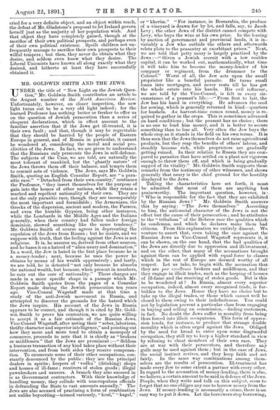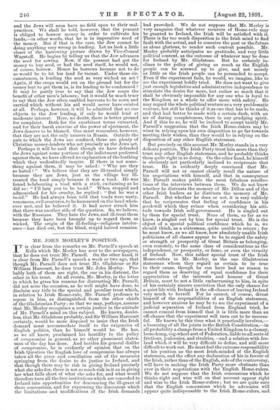MR. GOLDWIN SMITH AND THE JEWS. TINDER the title of
" New Light on the Jewish Ques- tion," Mr. Goldwin Smith contributes an article to the August number of the North American Review. Unfortunately, however, on closer inspection, the new light turns out to be a very old light indeed; for the learned Professor has nothing better or fresher to offer us on the question of Jewish persecution than a series of eloquent declarations, which in effect amount to the familiar assertion that if the Jews get ill-treated, it is their own fault ; and that, though it may be regrettable that they should be harried by the people of Eastern Europe in general, and of Russia in particular, it cannot be wondered at, considering the moral and social pro- clivities of the Jews. In fact, we are given to understand that the Russians only persecute the Jews in self-defence. The subjects of the Czar, we are told, are naturally the most tolerant of mankind, but the ' ghastly nature' of the Jews throws them off their balance, and tempts them to commit acts of violence. The Jews, says Mr. Goldwin Smith, quoting an English Consular Report, are " a para- sitic race." " Detached from their own country," continues the Professor, " they insert themselves for the purpose of gain into the homes of other nations, while they retain a marked and repellent nationality of their own. They are not the only parasitic race, though they are incomparably the most important and formidable ; the Armenians, the Greeks of the dispersion, ancient and modern, the Parsees, and even the humble Gypsies, being other instances, while the Lombards in the Middle Ages and the Italians generally, when their country had fallen under foreign dominion, showed something like the same tendency." Mr. Goldwin Smith of course agrees in deprecating the expulsion of the Jews from Russia ; but he insists, and we suppose with truth, that the feeling against the Jews is not religious. It is, he assures us, derived from other sources, and he bases it on a hatred of " alien usury and domination." In a word, the Jew is hated in the first place because he is a money-lender ; next, because he uses the power he obtains by means of his wealth oppressively ; and lastly, we are told, he is detested " not only because he absorbs the national wealth, but because, when present in numbers, he eats out the core of nationality." These charges are made in a more specific shape in a passage which Mr. Goldwin Smith quotes from the pages of a Consular Report made during the Jewish persecution ten years ago. Vice-Consul Wagstaff made at that time a study of the anti-Jewish movement in Russia, and attempted to discover the grounds for the hatred which the Jews inspire. His account of the Jews in Russia appears to be correct, and though it is cited by Mr. Gold- win Smith to prove his contention, we are quite willing to accept it as a fair estimate of the Russian Jews. Vice-Consul Wagstaff, after noting their " sober, laborious, thrifty character and superior intelligence," and pointing out how they more and more tend to obtain a monopoly of commerce, proceeds to note that it is chiefly as "brokers or middlemen" that the Jews are prominent :—" Seldom a business transaction of any kind takes place without their intervention, and from both sides they receive compensa- tion. To enumerate some of their other occupations, con- stantly denounced by the public: they are the principal dealers in spirits; keepers of vodka' (drinking) shops and houses of ill-fame ; receivers of stolen goods ; illegal pawnbrokers and usurers. A branch they also succeed in is as Government contractors. With their knowledge of handling money, they collude with unscrupulous officials in defrauding the State to vast amounts annually." The Jews are also accused of practising a form of combination not unlike boycotting—termed variously, " koul," " kagal," or " kherim." "For instance, in Bessarabia, the produce of a vineyard is drawn for by lot, and falls, say, to Jacob Levy ; the other Jews of the district cannot compete with. Levy, who buys the wine at his own price. In the leasing- by auction of government and provincial lands, it is in- variably a Jew who outbids the others and afterwards relets plots to the peasantry at exorbitant prices." Next, we are told that petty usury is largely practised by the Jews :—" Given a Jewish recruit with a few roubles capital, it can be worked out, mathematically, what time it will take him to become the money-lender of his company or regiment, from the drummer to the Colonel." Worst of all, the Jew acts upon the small proprietor like a baneful parasite. He turns small loans into mortgages, and never rests till he has got the whole estate into his hands. His evil influence,. we are told by the Vice-Consul, is felt in every cir- cumstance of a peasant's life :—" From first to last, the Jew has his hand in everything. He advances the seed for sowing, which is generally returned in kind—quarters for bushels. As harvest-time comes round, money is re- quired to gather in the crops. This is sometimes advanced. on hard conditions ; but the peasant has no choice ; there is no one to lend him money, and it is better to secure something than to lose all. Very often the Jew buys the whole crop as it stands in the field on his own terms. It is thus seen that the Jews themselves do not raise agricultural products, but they reap the benefits of others' labour, and steadily become rich, while proprietors are gradually getting ruined. In their relation to Russia they are com- pared to parasites that have settled on a plant not vigorous enough to throw them off, and which is being gradually sapped of its vitality." Mr. Goldwin Smith supports these remarks from the testimony of other witnesses, and shows generally that usury is the chief ground for the hostility displayed to the Jews.
Taking the characteristics here set forth, it must be admitted that most of them are anything but praiseworthy. The important question, however, is :. " Who is responsible for the fact that they are exhibited. by the Russian Jews ?" Mr. Goldwin Smith answers- this by saying : " The Jews themselves." According to him, the anti-social character of the Jews is not the effect but the cause of their persecution ; and he attributes to the " tribalism " of the Hebrew race the qualities which- he condemns, and which he declares make them bad citizens. From this explanation we entirely dissent. We venture to assert that, even taking the case against the Russian Jews as Vice-Consul Wagstaff represents it, it can be shown, on the one hand, that the bad qualities of the Jews are directly due to oppression and ill-treatment, . and on the other, that many of the accusations brought against them can be applied with equal force to classes which in the rest of Europe are deemed worthy of all respect. Let us take, to begin with, the accusation that. they are par excellence brokers and middlemen, and that- they engage in illicit trades, such as the keeping of houses- of ill-fame and the receiving of stolen goods. But is this to be wondered at ? In Russia, almost every superior occupation, indeed, almost every recognised trade, is for- bidden to the Jews. Hence they have no choice but to take up the illegal trades, or those which cannot well be closed to them owing to their indefiniteness. You could not by legislation prevent a particular class from engaging in buying and selling on commission,—finding customers, in fact. No doubt the Jews suffer in morality from being thus forced into illicit occupations. This form of oppres- sion tends, for instance, to produce that strange double morality which is often urged against the Jews. Obliged by the need for bread to enter upon some disgraceful occupation, they still try to keep a higher standard in view by refusing to cheat members of their own race. They are at war with their persecutors, and therefore any guile may be used against them ; but in the case of Jews, the social instinct revives, and they keep faith and act fairly. In the same way combinations among them- selves are the results of persecution. Ill-treatment has made every Jew to some extent a partner with every other. In regard to the accusation of money-lending, there is also, we believe, a certain amount to be said in defence of the Jews. People, when they write and talk on this subject, seem to forget that no one obliges any one to borrow money from the Jews. If money-lending is necessarily a crime, there is an. easy way to put it down. Let the borrowers stop borrowing,. and the Jews will soon have no field open to their mal- practices. We shall be told, however, that the peasant is obliged to borrow money in order to cultivate his lands,--in other words, that he is in imperative need of the money. But if that is the case, the Jew cannot be doing anything very wrong in lending. Let us look a little closer at the harrowing picture drawn by Vice-Consul Wagstaff. He begins by telling us that the Jew advances the seed for sowing. Now, if the peasant had got the money to buy seed, or had the seed itself, he would not, of course, borrow. Hence he borrows because not to do so would be to let his land lie vacant. Under these cir- cumstances, is lending the seed so very wicked an act ? Again, if the crops would rot on the ground but for the money lent to get them in, is its lending to be condemned ? It may be partly true to say that the Jew reaps the benefit of other men's labours ; but it would be much truer to say that the Jew often enabled harvests to be sown and carried which -without his aid would never have existed at all. Perhaps, however, it will be admitted that no one objects to the Jew lending, if only he would lend at moderate interest. Here, no doubt, there is better ground for complaint. Both for the exorbitant terms extracted, and for their harsh exercise of the power of ejectment, the Jews deserve to be blamed. One must remember, however, that they are not the only usurers in Russia. Outside the pale to which the Jews are confined, there are plenty of Christian money-lenders who act precisely as the Jews act. Perhaps it will be said that though we have defended the Jews against some portions of the indictment preferred against them, we have offered no explanation of the loathing which they undoubtedly inspire. If there is not some- thing against them, it may be asked : " Why are they so hated ? " We believe that they are ill-treated simply because they are Jews, just as the village boy ill- treated the toad simply because it was a toad. He was found belabouring a toad with a stick, exclaiming as he did so : " I'll larn you to be to-rid." When stopped and admonished for his cruelty, he replied : " But he war a to-ad." He had always been told that toads were nasty, venomous, evil creatures, to be hammered on the head when- ever met, and he believed it. It had never struck him that there was another side of the question. So, we believe, with the Russians. They hate the Jews, and ill-treat them because they have been brought up to regard them as wicked. The origin of the ill-feeling—religious intoler- ance—has died out, but the blind, stupid hatred remains.



































 Previous page
Previous page